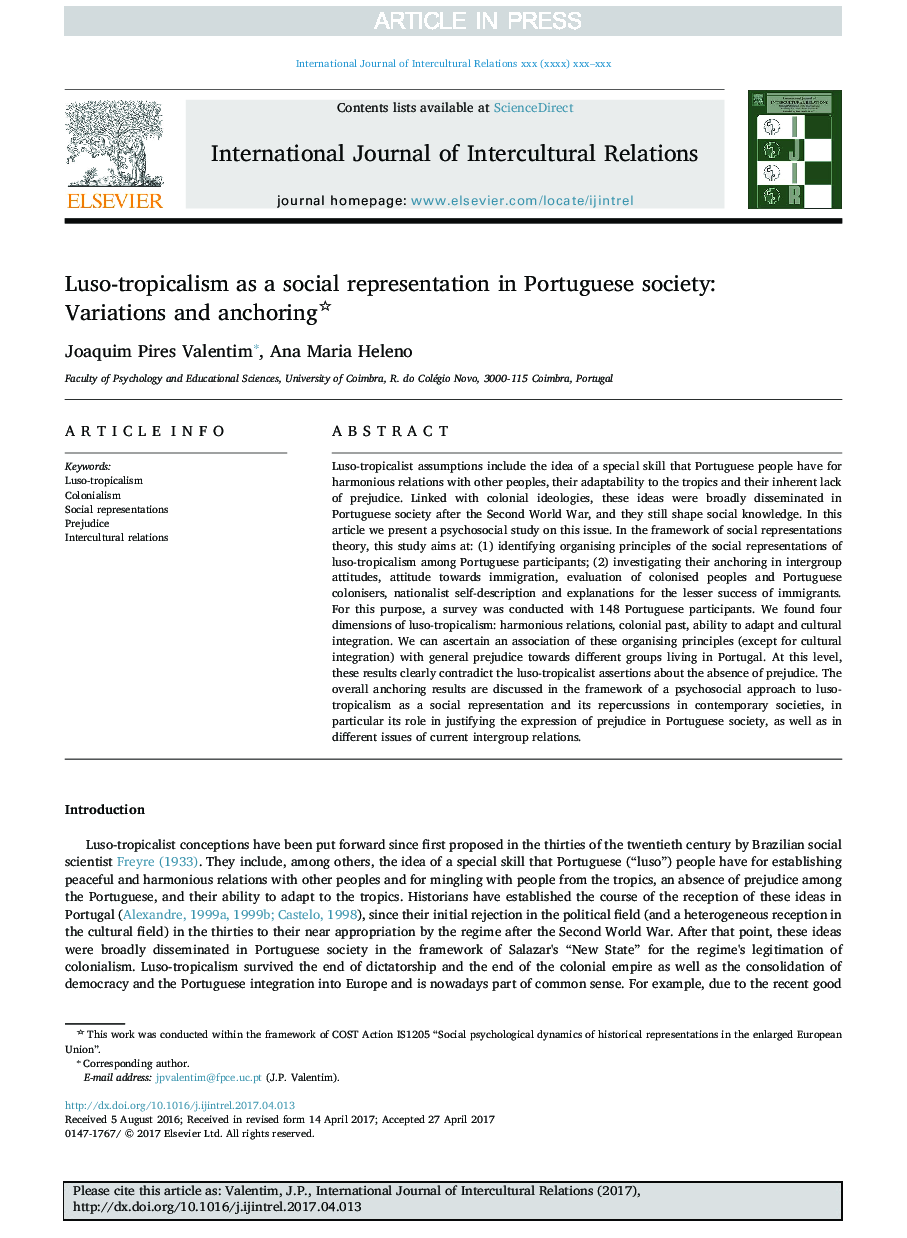| کد مقاله | کد نشریه | سال انتشار | مقاله انگلیسی | نسخه تمام متن |
|---|---|---|---|---|
| 7323647 | 1475728 | 2018 | 9 صفحه PDF | دانلود رایگان |
عنوان انگلیسی مقاله ISI
Luso-tropicalism as a social representation in Portuguese society: Variations and anchoring
ترجمه فارسی عنوان
لوسو تروپیکالیزم به عنوان نمایندگی اجتماعی در جامعه پرتغالی: تنوع و لنگرگاه
دانلود مقاله + سفارش ترجمه
دانلود مقاله ISI انگلیسی
رایگان برای ایرانیان
کلمات کلیدی
لوسو تروپیکالیسم، استعمارگرایی نمایندگی های اجتماعی، تعصب، روابط میان فرهنگی،
ترجمه چکیده
مفروضات لوسو تروپولیسم عبارتند از ایده یک مهارت ویژه که مردم پرتغالی برای روابط هماهنگ با دیگر مردم، سازگاری آنها با مناطق گرمسیری و عدم وجود تعصب ذاتی آنها دارند. با ایدئولوژی های استعماری همراه بود، این ایده ها پس از جنگ جهانی دوم در جامعه پرتغال پخش شد و هنوز هم دانش اجتماعی را شکل می دهند. در این مقاله ما یک مطالعه روانشناختی در مورد این موضوع ارائه می کنیم. در چارچوب نظریه بازنگری اجتماعی، این مطالعه با هدف: (1) شناسایی اصول سازماندهی بازنمایی اجتماعی لوس تروپیکالیسم در بین شرکت کنندگان پرتغال؛ (2) بررسی لنگرگاه خود را در نگرش های بین گروهی، نگرش نسبت به مهاجرت، ارزیابی از مردم استعمار و استعمارگران پرتغالی، خود توصیف ناسیونالیستی و توضیحات برای موفقیت کمتر از مهاجران. برای این منظور، یک بررسی با 148 شرکت کننده در پرتغال انجام شد. ما چهار بعد لوس تروپیکیسم را یافتیم: روابط هماهنگ، گذشته استعماری، توانایی انطباق و ادغام فرهنگی. ما می توانیم پیوند این اصول سازماندهی (به جز یکپارچگی فرهنگی) را با تعصب عمومی نسبت به گروه های مختلف زندگی می کنیم که در پرتغال زندگی می کنند. در این سطح، این نتایج به وضوح با ادعاهای لوس تروپیکالیستی در مورد فقدان تعصب مخالف هستند. نتایج کلی لنگرگاه در چارچوب یک رویکرد روانشناختی به لوس تروپیکیسم به عنوان نمایندگی اجتماعی و پیامدهای آن در جوامع معاصر، به ویژه نقش آن در توجیه بیان تعصب در جامعه پرتغالی و همچنین در مسائل مختلف فعلی مورد بحث قرار می گیرد. روابط بین گروهی.
موضوعات مرتبط
علوم انسانی و اجتماعی
مدیریت، کسب و کار و حسابداری
کسب و کار و مدیریت بین المللی
چکیده انگلیسی
Luso-tropicalist assumptions include the idea of a special skill that Portuguese people have for harmonious relations with other peoples, their adaptability to the tropics and their inherent lack of prejudice. Linked with colonial ideologies, these ideas were broadly disseminated in Portuguese society after the Second World War, and they still shape social knowledge. In this article we present a psychosocial study on this issue. In the framework of social representations theory, this study aims at: (1) identifying organising principles of the social representations of luso-tropicalism among Portuguese participants; (2) investigating their anchoring in intergroup attitudes, attitude towards immigration, evaluation of colonised peoples and Portuguese colonisers, nationalist self-description and explanations for the lesser success of immigrants. For this purpose, a survey was conducted with 148 Portuguese participants. We found four dimensions of luso-tropicalism: harmonious relations, colonial past, ability to adapt and cultural integration. We can ascertain an association of these organising principles (except for cultural integration) with general prejudice towards different groups living in Portugal. At this level, these results clearly contradict the luso-tropicalist assertions about the absence of prejudice. The overall anchoring results are discussed in the framework of a psychosocial approach to luso-tropicalism as a social representation and its repercussions in contemporary societies, in particular its role in justifying the expression of prejudice in Portuguese society, as well as in different issues of current intergroup relations.
ناشر
Database: Elsevier - ScienceDirect (ساینس دایرکت)
Journal: International Journal of Intercultural Relations - Volume 62, January 2018, Pages 34-42
Journal: International Journal of Intercultural Relations - Volume 62, January 2018, Pages 34-42
نویسندگان
Joaquim Pires Valentim, Ana Maria Heleno,
